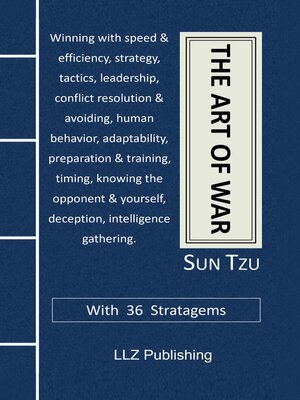
Sign up to save your library
With an OverDrive account, you can save your favorite libraries for at-a-glance information about availability. Find out more about OverDrive accounts.
Find this title in Libby, the library reading app by OverDrive.



Search for a digital library with this title
Title found at these libraries:
| Loading... |
This audiobook is narrated by a digital voice.
"Had I read this military treatise earlier, I might have avoided the disastrous defeat at Waterloo." — Napoleon of France
"The Art of War" is a classic Chinese military treatise attributed to Sun Tzu, a military strategist, and philosopher who lived in ancient China. Believed to have been written in the 5th century BCE, this influential work remains one of the most studied and widely read texts on strategy and tactics.
The book is composed of thirteen chapters, each focusing on different aspects of warfare and strategy. While it is primarily a treatise on military strategy, its principles have been applied in various fields beyond the battlefield, including business, politics, and sports.
Here are some key themes and principles discussed in "The Art of War":
Strategic Planning: Sun Tzu emphasizes the importance of strategic planning, understanding the enemy, and knowing oneself. He stresses that victories are won before the actual combat through careful planning and preparation.
Deception and Intelligence: The text underscores the use of deception as a crucial element in warfare. Sun Tzu emphasizes the importance of spies, reconnaissance, and gathering intelligence to gain an advantage over the enemy.
Tactical Dispositions: The book delves into the importance of adaptability and flexibility in tactics. Sun Tzu advises that one should be able to adapt to changing circumstances and exploit the weaknesses of the enemy.
Strengths and Weaknesses: Understanding one's strengths and weaknesses, as well as those of the enemy, is essential. Sun Tzu discusses the concept of "winning without fighting" by exploiting the enemy's vulnerabilities and avoiding their strengths.
Terrain and Environment: The importance of understanding the terrain and environmental factors in warfare is highlighted. Sun Tzu discusses how favorable conditions can be leveraged for strategic advantage.
Leadership and Morale: Effective leadership, discipline, and maintaining high morale among troops are emphasized as crucial factors in achieving victory.






